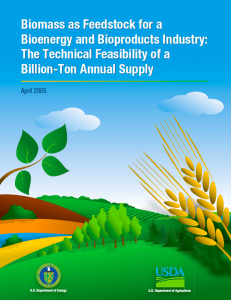The Department of Energy (DOE) has concluded its Billion Ton Study that was first conducted in 2005. This new version of the report confirms that America has ample biomass resources including grasses, ag wastes, and wood wastes among others to meet America’s national renewable fuel goals. One goal of the study was to assess the amount of biomass available that would not impact U.S. farms and forest products such as food, feed and fiber crops.
“Developing the next generation of American biofuels and bioenergy will help diversify our energy portfolio, reduce our dependence on foreign oil, and produce new clean energy jobs,” said U.S. Energy Secretary Steven Chu. “This study identifies resources here at home that can help grow America’s bioenergy industry and support new economic opportunities for rural America.”
 The study confirms that there are ample volumes of biomass feedstocks available for conversion into ethanol and other biofuels that would meet the requirements as set forth in the Renewable Fuel Standard (RFS). The RFS sets out a goal of producing 21 billion gallons of fuel by 2022 from advanced or cellulosic biofuels – in other words, biofuels produced from non-starch crops. The DOE study states, “This potential resource is more than sufficient to provide feedstock to produce the required 20 billion gallons of cellulosic biofuels. The high-yield scenario demonstrates potential at the $60 price that far exceeds the RFS mandate.”
The study confirms that there are ample volumes of biomass feedstocks available for conversion into ethanol and other biofuels that would meet the requirements as set forth in the Renewable Fuel Standard (RFS). The RFS sets out a goal of producing 21 billion gallons of fuel by 2022 from advanced or cellulosic biofuels – in other words, biofuels produced from non-starch crops. The DOE study states, “This potential resource is more than sufficient to provide feedstock to produce the required 20 billion gallons of cellulosic biofuels. The high-yield scenario demonstrates potential at the $60 price that far exceeds the RFS mandate.”
Brooke Coleman, executive director of the Advanced Ethanol Council said of the study, “America has both the resources and the know-how to break our addiction to foreign oil. What is lacking is the political will to stand up to oil special interests and level the playing field for all biofuels, including next generation ethanol, to compete. Scores of promising technologies are ready for commercial deployment, but are being held up by an unstable and unpredictable policy climate.”
He concluded, “In order to deploy these technologies to harness the potential of America’s vast biomass resources, and to compete in the global race to produce next generation fuels, consistent and stable policy relating to biofuels is essential. That means continuing investment in new technologies, expanding refueling opportunities for domestically produced, non-petroleum fuels like ethanol, and protecting the integrity and the intent of the RFS.”

